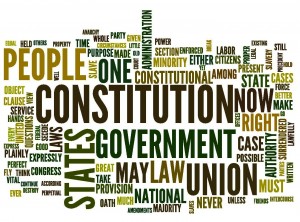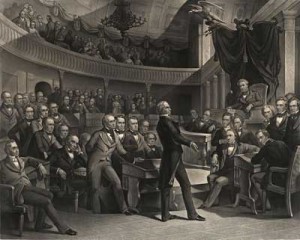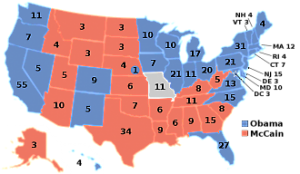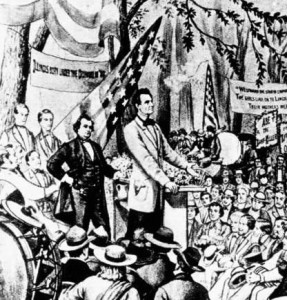 Former CBO and OMB director Peter Orzag had an article in the New Republic on Monday that made two claims: first, that political polarization in America is causing legislative gridlock that is reducing the capacity for even basic government functions; and second, that the solution to this problem is to shift some decision-making away from the legislature and toward institutional actors that are more insulated from the small-d democratic will of the voters.
Former CBO and OMB director Peter Orzag had an article in the New Republic on Monday that made two claims: first, that political polarization in America is causing legislative gridlock that is reducing the capacity for even basic government functions; and second, that the solution to this problem is to shift some decision-making away from the legislature and toward institutional actors that are more insulated from the small-d democratic will of the voters.
Not surprisingly, there’s been a tidal wave of criticism. Michael Poterma thinks Orzag is just whining. Andrew Gelman calls him an elitist. Drudge is running the headline “Former Obama budget director: ‘we need less democracy’ to ‘counter gridlock’…”. DIA says his solutions are “useless” because they can’t be implemented. David Dayen says it’d be bad if they were. Ditto from Paul Krugman. The comments at Hot Air are unbelievable. And so on and so forth. I have no intention of defending Orzag here: he indeed comes off in the article as a smug elitist who thinks he could solve everything if it just weren’t for the pesky voters.
Still, I thought Ezra Klein succinctly made the most important point: Orzag’s implicit premise — that democracy causes polarization and, in turn, gridlock — is wrong. Instead, the causes of gridlock are institutional, either baked into the Constitutional cake (separation of powers between political actors elected by different constituencies on different time-lines; multiple veto points; supermajority hurdles) or arrived at through the development of institutional rules (committee system; filibuster; etc.). In effect, it’s the anti-majoritarian character of the institutions that is causing the gridlock; a majoritarian parliamentary system (in effect, a sovereign House) could in theory be incredibly democratic, incredibly polarized, and experience almost no gridlock. Ezra also made an important second point: many of Orzag’s ideas aren’t even anti-democratic in any sense. For instance, tying UI and the payroll tax to the unemployment rate may or may not be good public policy, but it’s a policy decision that is produced by the regular democratic process and has no effect on said process.
And yet, I can’t shake the feeling that a lot of the animosity toward the Orzag article is rooted in an impulse that I think is fundamentally wrong: the idea that more democracy always equals good, and that less democracy always equals bad. A lot of people tend to apply this sort of democracy=good frame by default when evaluating institutional designs, and I think it’s a mistake.
Eight rambling points, none really about Orzag or his article:
1. Democracy is the least-worst form of government ever devised. I don’t want anyone to get the idea that I’m one of those anti-democracy cynics you often run into in casual policy debates. Such people, if you press them, will usually reveal themselves as elitists who are more or less disdainful of the wisdom of pretty much everyone else. Their trick is to force you to compare democracy as practiced against some normative ideal, without ever themselves proposing a real-world alternative. The truth is that Churchill was right. No real-world alternative even comes close. Democracy gives government leaders the most incentive to act in a way least-harmful to the people. That’s far from perfect, but it’s as good as you’ll get. Unless you still believe in benevolent monarchs and philosopher kings.
Cranky partisans and Euro-philes will also sometimes argue that American democracy is inferior to parliamentary democracy, but that’s mostly because they haven’t lived under it and seen it in action, which creates the same ideal vs. as-practiced false construct. The varieties of western democracy each have their benefits and drawbacks, but I have never seen evidence that any single system is inherently better than any other, at least not in any qualitative way. Might America be better off under a parliamentary system? Perhaps, but I doubt it would substantially alter a meta-evaluation of the quality or desirability of American democracy. It would still be pretty good, and people would still routinely complain about it.
2. Democracy isn’t best in every circumstance. This is the heart of the problem. Because democracy is, at the systemic level, by far the best available governing arrangement, people tend to assume it’s the best arrangement in all situations. But there are specific situations in which non-democratic systems enjoy advantages over democracies. Two examples are commonly given: first, war-making stamina. Dictatorships can continue to fight long after democracies would have surrendered due to negative public opinion. Would a democratic Russia have survived the German assault on the Eastern front? Would the western allies have been able to weather that level of casualties? I doubt it. (Of course, I’d rather have democratic control over the decision to go to war, as monarchs/dictators have a penchant for starting silly and unncessary wars.)
The second set of examples is far more important: democracies are not good at long-term planning, because the short-term electoral calendar gets in the way. Dictators can overcome J-curves when instituting things like market reforms precisely because they aren’t accountable to voters in the short-term. And so there are situations in which a democracy may want to mimic a less-accountable form of government, for the purpose of passing J-curve type policies. Therefore, legislators seeking to make good public policy have an incentive to devise institutions that are less democratically accountable, so that the long-term interests of the people can be met without electoral backlash against the short-term negative consequences followed by policy reversal of the long-term plan.
3. There’s an important distinction between democracy and majoritarianism. This is expanding on Ezra’s point. You can have a system of government that is very democratic and at the same time non-majoritiarian (consider a direct democracy with a supermajority requirement), and you can also have the opposite (consider a sovereign majoritarian parliamentary republic in which all MPs were elected indirectly by local legislatures, which themselves were elected by a very narrow franchise). So they are distinct concepts. One addresses the proximity of the citizen population to the decisions; the other addresses the amount of agreement required among that citizen population.
People tend to confuse these things when they attack arrangements or ideas that they consider anti-democratic. The filibuster isn’t really anti-democratic, it’s just anti-majoritarian. Ditto with unanimous jury requirements. Same thing with the veto power. On the other hand, a repeal of the 17th amendment woudn’t really be anti-majoritarian, but it would definitely be anti-democratic. Once you separate the two ideas, I’m pretty sure that most people have a bigger problem with non-majoritarian systems than they do with mildly non-democratic systems. (Although, in general, I believe most people are situational majoritarians. For example, many people hate the filibuster and deride it with every argument under the sun about things like “the will of the people” when it blocks policies they like. When it helps them, they are mum. Such people also tend to not complain about the veto power, which is probably more anti-majoritarian than the filibuster.)
4. Broadly speaking, America has become more democratic during the last 200 years. In 1789, America was something of a democracy, and almost certainly the most democratic nation in the world. But a contemporary nation with an America-circa-1789 democracy wouldn’t seem particularly democratic. Voting was limited in many states to white men who met property and other qualifications; only one-half of one branch of the federal government was chosen through popular election; and many of the liberal rights that we consider necessary ingredients of a functioning modern democracy, such as a free press or the right to a jury trial, were not constitutionally guaranteed at either the federal or state level.
Over time, the trappings of mass-democracy developed. Civil liberties were amended into the constitution in the 1790’s. Universal white male suffrage was more or less achieved by 1832. Mass political parties arose. Popular voting for the electoral college were adopted everywhere by 1868. The franchise was guaranteed to non-whites and to women by the early 20th century. Ditto for the direct election of Senator. In short, 18th century concerns about the sustainability of a mass democracy were proven to be unnecessary worries, and many were unraveled over the first 100 or so years of the nation.
5. The contemporary United States is one of the most democratic nations on earth. Most people don’t realize it, but from a comparative perspective, America is one of the most election-intensive nations. Americans spend more time voting than pretty much any other citizenry. As Anthony King has described, American politicians are perhaps the most vulnerable in the western world: they face re-election more often, they are helped less by their parties, and they must do more self-fundraising. The consequence is that American politicians tend to be hyper-sensitive to their constituents, given their comparative electoral connection. And this has policy consequences, especially when trying to solve problems that have long-term benefits but incur short-term costs.
Again, this doesn’t address the anti-majoritarian concern; that’s still there. But the U.S. is a very democratic system, perhaps to a fault. After all, this is one of the most common complaints in DC: that the elected officials spend too much time thinking about campaigns and elections, and not enough time thinking about policy. The two-year cycle is often described as too short for the modern age, forcing Members to start fundraising earlier in the cycle, leaving little time for actual governance. Which leads a lot of people to the logical conclusion that the terms of Members of the House should be extended by Constitutional amendment, perhaps to 3 years. But note that this is a clear anti-democratic move. If you think it’s a good idea, then you (indirectly) agree with the thrust of Orzag’s piece. But my sense is that many people who think congressional terms should be extended would be fierce critics of his article.
6. There’s a difference between “less democratic” and “not democratic.” This is important. The pre-17th amendment Senate was democratic, it was just less directly democratic than the post-17th amendment Senate. It’s similar to the difference between a direct democracy and a republic. No matter how many independent commissions Congress sets up, it’s still Congress setting them up and it’s still always possible for Congress to dismantle them. Yes, there’s the “ratcheting up” problem of the presidential veto and giving power to the executive branch, but the general principle still holds: if somewhat more than the majority of Americans have a burning desire to dismantle the Fed and for monetary policy to be handled in Congress, it will eventually happen. You can say a lot of things about Congress, but you can’t say they aren’t responsive to the burning desires of their constituents.
It seems silly to me to say that an entity making decisions X lengths down the chain from the voters is somehow not democratic and yet an entity X-1 lengths away from the voters is perfectly democratic. We’re dealing in degrees here, not cutpoints. I don’t think of cabinet secretaries as non-democratic decision makers; but, in effect, that would be the consequence of a logic that asserts any entity Congress devises and grants decision-making authority to is so far removed from the voters that it can’t be considered democratic.
7. There are specific democratic reforms which have proven mediocre at best. In general, the direct democracy reforms of progressive-era westerners have not achieved the ends that were expected. The ballot initiative process is one such reform that leaps instantly to mind. Especially in California, it doesn’t seem to function as one’s normative desires might hope. Same thing with the recall provisions in various states; they don’t seem to do anything but keep people focused on electoral politics rather than policy politics. I also think the shift toward primaries in presidential nominating has been a mixed-result. There are definitely people who disagree, but I don’t see any evidence they have made the outcomes or the process better. But I think, overall, the consequential reduction in party power and rise of individual candidate power has had something of a negative effect on presidential-party relations and presidential-congressional relations.
There’s a related issue here, as well, and that’s transparency. In theory, transparency of decision-making in government is completely unrelated to democracy. You can have highly democratic non-transparent systems, and quite transparent non-democratic systems. But in practice, they tend to go hand in hand, and people who prefer more democracy (or more majoritarianism) tend to prefer more transparency. My sense is that the increase in transparency in the past generation or so has, at best, produced mixed results . In the House, two notable examples are the move toward recorded votes in the committee of the whole and the opening up to the public of committee markups. The intended effect of both of these reforms — to expose the policy process and make legislators accountable — is certainly noble, but I don’t think the objective has been met. For example, one unintended consequence of the open mark-up is that most of the real debate over the bill has been moved into the backrooms, prior to the markup. This makes sense: especially when the fight is intra-party, Members have all sorts of incentives not to air their grievances with each other in public. So the markups themselves are often dog and pony shows, and the real deals are now even further from public view than before.
8. There are specific anti-democratic reforms that have proven useful. Five years ago, I don’t think it would have been the least bit controversial when Orzag said in his article that an independent central bank was an excellent anti-democratic policy device. And I still don’t think there’s any doubt that it is. As Romney said the other night when the GOP candidates were piling on Bernake and the Fed, what’s the alternative? Should Congress Be Setting Monetary Policy? I think that’s exactly right, and it goes to the crux of the democracy argument: are there decisions that should be made in a setting more removed than Congress from electoral politics? And I think the answer is yes. Some of the critics of Orzag have made the point that entities like the Fed have not done particularly well in their technocratic decision-making as of late. But I think this again is a false comparison against a normative ideal: is there any evidence that Congress would have made better monetary policy decisions than the Fed over the last two years?
Orzag also uses the BRAC base closure example, and I think that (along with the Fed) partially refutes DIA, whose premise is that Congress could never set up such institutions correctly, because the will that is allegedly lacking (to solve the problem) will also be lacking to produce the insulated institution. But BRAC and the Fed were both produced by congressional legislation, and in the case of BRAC, Members came to actually like how it operated, because even when their base got closed, it wasn’t because they lost the politics (and were therefore ‘weak’ or could be blamed), but they still got to vote against it to boot!
/soapbox.
None of this is intended to be a defense of Orzag. As I said above, I think his article is silly, because he’s proposing a solution to a premise that I think is demonstrably false. Nevertheless, I think it’s important to remember that democratic decision making comes in many flavors, and that removing difficult policy decisions from direct democratic accountability isn’t fundamentally an elitist usurpation of the will of the people. It’s just a different arrangement of the institutional furniture in complex structure that is utterly democratic in the meta-sense.
Update (9/28 3:05pm): Jon Bernstein offers some insightful thoughts in response to the above, which I pretty much completely agree with. Here’s a snippet:
Independent commissions are useful only in cases in which politicians agree on what should be done but do not want the credit for doing it. It’s possible that these commissions are under-utilized by Congress right now, but mostly for relatively small and technical things. You’re not going to get a Grand Bargain out of a commission unless leading politicians from both sides secretly want a Grand Bargain on similar terms in the first place, and that’s not the case right now.
That strikes me as both correct and important. Go read the whole thing.
 I like presidential inaugurations. I like the symbolism of transferring power in a republic. I like the assembly of the entire government in one place. I like that they take place at the Capitol, subtly and whiggishly marking the legislature — and not the President — as the fundamental governmental entity. I like the flags and the bunting. And call me a sucker and a sentimentalist, I even like the speeches.
I like presidential inaugurations. I like the symbolism of transferring power in a republic. I like the assembly of the entire government in one place. I like that they take place at the Capitol, subtly and whiggishly marking the legislature — and not the President — as the fundamental governmental entity. I like the flags and the bunting. And call me a sucker and a sentimentalist, I even like the speeches.

















